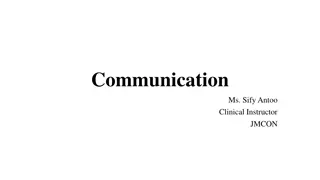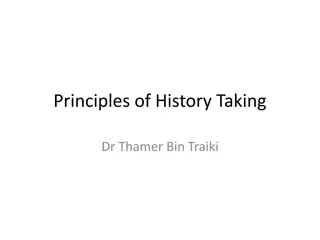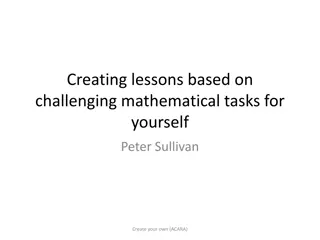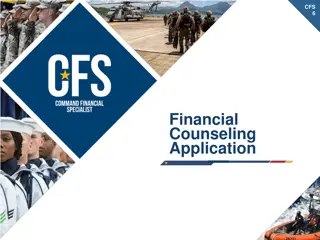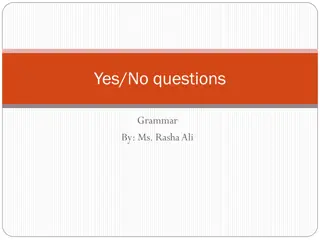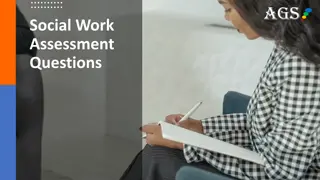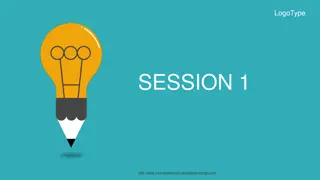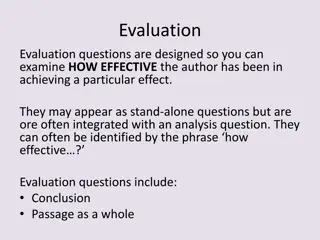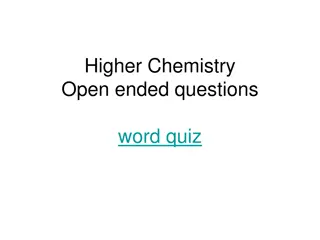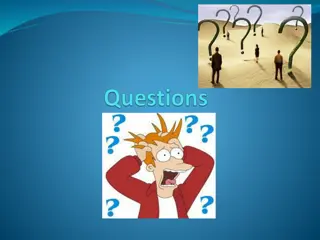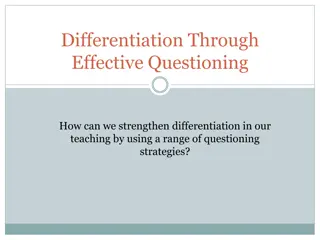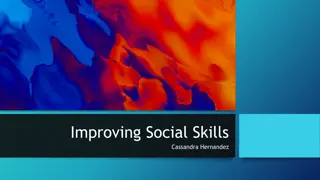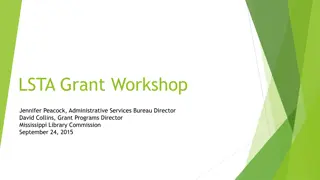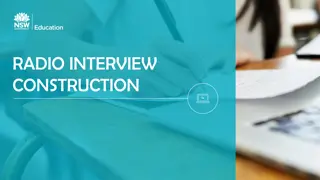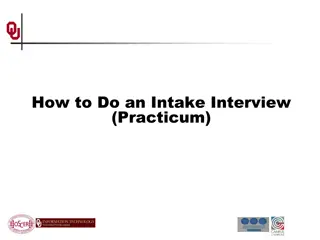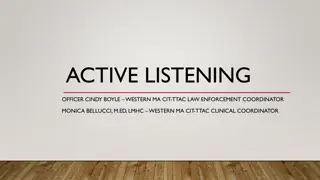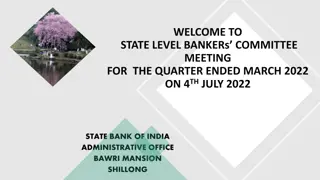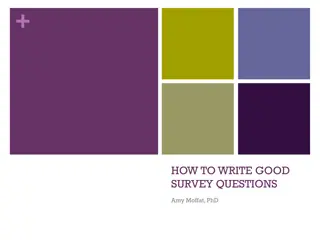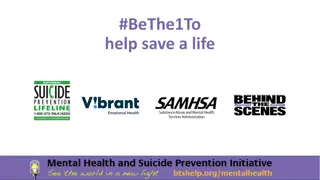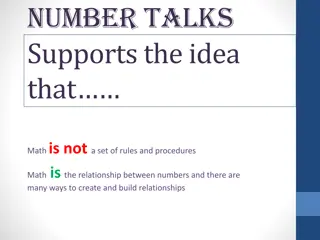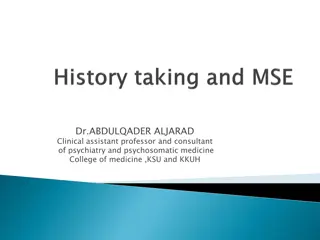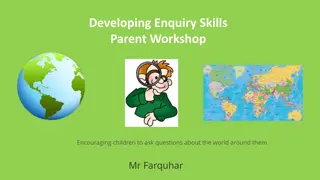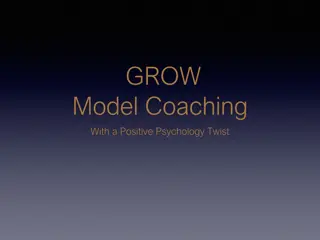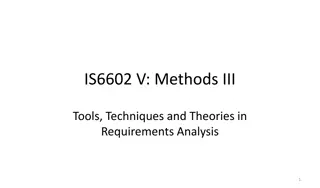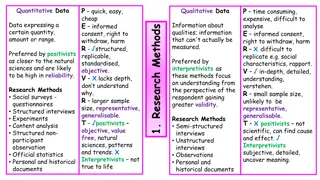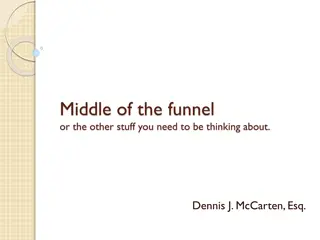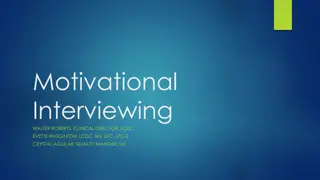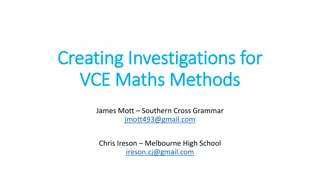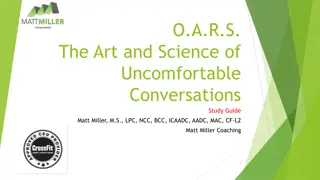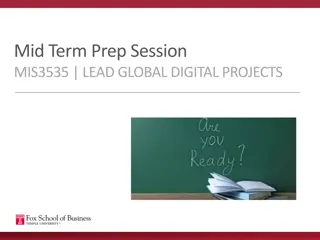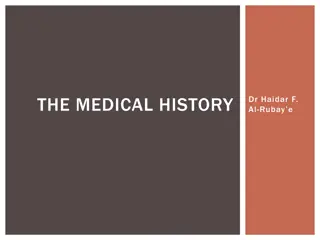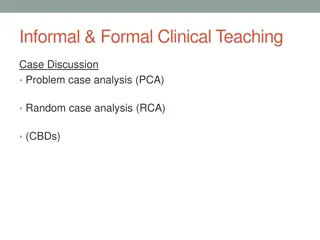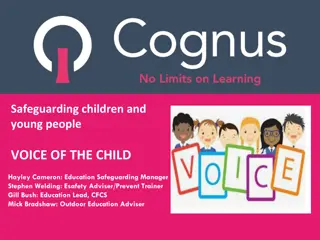Gus J. Solomon’s Voir Voir Dire Academy
Explore the world of Voir Dire Academy through images and resources, including federal and state court jury orientation videos, open-ended questions, and guidance on questions to avoid in Voir Dire. Engage in insightful content covering topics like unconscious bias, understanding implicit bias, and
1 views • 16 slides
Effective Communication Techniques in Nursing Education
Ms. Sify Antoo, a Clinical Instructor at JMCON, teaches students about communication techniques such as listening, broad openings, restating, clarification, and more. These skills are essential for nurses to establish rapport with patients, understand their needs, and provide effective care. By focu
0 views • 34 slides
Principles of History Taking in Clinical Assessment
History taking is a crucial process in patient assessment, aiding in determining the etiology of medical issues. Obtaining an accurate history through proper questioning, active listening, and maintaining a professional appearance is vital for making accurate diagnoses. The history should follow a s
1 views • 35 slides
Strategies for Creating Challenging Math Lessons
Explore strategies for enhancing mathematics lessons by transforming standard questions into engaging tasks. Learn to create open-ended questions, challenging tasks, and captivating lessons tailored to your students' needs. Empower your teaching with innovative approaches to inspire curiosity and cr
0 views • 51 slides
Financial Counseling Application Process Overview
Explore the 8-Step Counseling Cycle, Solution-Focused Financial Counseling, Counseling Fundamentals, Open-Ended Questions, Common Client Comments, Measuring Success in Counseling, and More Financial Counseling Tools. Engage in role-play scenarios to understand practical application.
1 views • 17 slides
Understanding Yes/No Questions in English Grammar
Yes/No questions in English grammar are essential for communication. These questions have two basic types - Yes/No questions and Wh-questions. Yes/No questions, also known as closed questions, have only two possible responses - Yes or No. To form a Yes/No question, verbs like BE, DO, HAVE, or modal
0 views • 9 slides
Effective Strategies for National 5 Chemistry Extended Answer Questions
National 5 Chemistry Paper 2 typically includes two open-ended questions worth 3 marks each, designed to test your understanding of key chemical principles. This guide offers advice on how to approach and excel at these questions, emphasizing the importance of careful reading, application of chemica
0 views • 24 slides
Social Work Assessment Questions Guide
Social work assessments involve gathering data about an individual's life to aid in achieving positive outcomes. This guide provides sample questions categorized under key areas like situation, safety, survival needs, etc. It emphasizes the importance of using open-ended questions for a more detaile
0 views • 10 slides
Main Represented Figures for Quarter Ended March 31, 2017 - Financial Insights
The provided information details the main represented figures for the quarter ended March 31, 2017, focusing on revenue, EBITDA, operating income, net income, investments, cash flow, and financial debt within the context of IFRS adjustments. It also includes a breakdown of revenue by segment for the
5 views • 4 slides
Enhancing Language Skills Through Wh-Questions Workshop
This workshop focuses on developing language skills through the use of wh-questions. Participants engage in pair work, individual activities, and a presentation to practice asking and answering personal questions. The session includes activities such as writing personal questions, answering question
1 views • 8 slides
Social Work Assessment Questions Guide
Dive into the world of social work assessments with this comprehensive guide. Learn about the key categories, question types, and how to gather essential information effectively. Understand the importance of open-ended questions and explore sample questions related to various aspects of social work
0 views • 10 slides
Mastering the Art of Writing AP Open-Ended Essays
Enhance your AP open-ended essay writing skills by incorporating specific evidence from the novel, detailing your examples, maintaining thematic focus, and avoiding vague responses. Emphasize the importance of a clear introduction, multiple detailed paragraphs, and precise responses to the prompt fo
1 views • 13 slides
Analysis of Evaluation and Conclusion Questions in Textual Analysis
Evaluation and Conclusion questions play a crucial role in assessing the effectiveness of an author in achieving specific effects and summarizing key points in a passage. These types of questions are commonly found in textual analysis tasks to evaluate the success of conveying ideas and themes. Eval
0 views • 9 slides
Enhancing Occupation Coding Efficiency During Interviews in Mixed-Mode Surveys
Explore the benefits of coding occupation data during interviews in web-first mixed-mode surveys. Previous research suggests reduced errors, improved data quality, and cost/time savings. The practice involves open-ended questions, manual or computer-aided coding, and potential interviewer advantages
1 views • 22 slides
Understanding Chemistry through Open-Ended Questions
The content provides a detailed assessment of student responses to open-ended chemistry questions related to hydrogen peroxide and its applications in teeth whitening gels. Various student answers are analyzed based on their understanding of the chemistry concepts involved, with explanations given f
1 views • 18 slides
Understanding Different Types of Questions and Short Answers in English Grammar
This content covers various question forms in English grammar, including general questions, special questions, alternative questions, tag questions, direct and indirect questions, yes-no questions, and short answers. It explains the structure and usage of each type of question with helpful examples
1 views • 24 slides
Strengthening Differentiation Through Effective Questioning Strategies
Strengthening differentiation in teaching through a range of questioning strategies is crucial for promoting deeper thinking and engagement among students. By encouraging more questions and focusing on the process of inquiry, educators can ignite curiosity, creativity, and critical thinking skills.
0 views • 23 slides
Enhancing Social Skills for Better Connections
Understanding the importance of social skills in building relationships and promoting overall well-being. Explore practical tips like behaving like a social person, asking open-ended questions, encouraging others to talk, offering compliments, practicing good manners, and being mindful of body langu
0 views • 10 slides
Restructuring LSTA Grant Reporting for Enhanced Performance Assessment
Redesigning the reporting process for LSTA grants to transition from open-ended narrative fields to structured, closed-ended fields, aiming to improve comparability, enable evidence-based decision-making, and foster collaboration among state library agencies.
0 views • 22 slides
Insightful Guide to Conducting a Radio Interview
Constructing and conducting a radio interview involves entertaining, informing, and persuading an educated audience. The language should be formal yet conversational, with natural speech elements like ellipsis and humor. The interview structure comprises a thoughtful introduction, engaging body with
0 views • 11 slides
Mastering the Intake Interview Process for Practicum Success
Learn the crucial steps to conduct a successful intake interview in a practicum setting. Explore goals, effective communication strategies, and specific open-ended questions to build a strong professional relationship with researchers. Dive into breakout room activities to practice modeling intake i
0 views • 6 slides
Effective Communication through Active Listening Techniques
Enhance your communication skills by practicing active listening techniques such as maintaining empathy, utilizing effective pauses, minimal encouragers, and open-ended questions. By being fully engaged and understanding others' emotions, you can facilitate better connections and responses in variou
0 views • 9 slides
State Level Bankers Committee Meeting for the Quarter Ended March 2022
The State Level Bankers Committee (SLBC) meeting for the quarter ended March 2022 was held at the State Bank of India Administrative Office in Shillong. The agenda included discussions on various actions taken reports, deployment of banking services in rural areas, ensuring financial inclusion and c
0 views • 30 slides
Mastering the Art of Crafting Effective Survey Questions
Crafting good survey questions is essential for gathering accurate and meaningful data. Dr. Amy Moffat, PhD, provides valuable insights on key characteristics of survey questionnaires, best practices for asking survey questions, and how to avoid common pitfalls like double-barreled and biased questi
0 views • 16 slides
Steps to Help Save a Life: Suicide Prevention Communication
Learn the evidence-based five action steps for communicating with someone who may be suicidal: Ask, Be There, Keep Them Safe, Help Them Connect, and Follow Up. Use open-ended questions, reflective listening, and pay special attention to those struggling during Covid-19.
0 views • 22 slides
Embracing Number Talks for Mathematical Growth
Number Talks support the idea that math is about relationships between numbers, fostering accuracy, efficiency, and flexibility in problem-solving. These discussions allow students to explore various strategies, encouraging a deep understanding of foundational mathematical concepts. Through open-end
0 views • 17 slides
Understanding and Addressing Survey Fatigue in Program Evaluation
Survey fatigue can lead to insufficient effort responding in program evaluations, affecting the quality of data collected. This presentation explores the causes and impacts of survey fatigue, suggests solutions such as shorter surveys and open-ended questions, and discusses alternatives to tradition
0 views • 12 slides
Comprehensive Approach to Psychiatric Diagnosis and Patient Assessment
Dr. Abdulqader Aljarad, a clinical assistant professor and consultant of psychiatry, emphasizes the importance of obtaining necessary information, establishing rapport with patients, and understanding their circumstances to make an accurate diagnosis. The process involves putting patients at ease, s
0 views • 32 slides
Encouraging Inquiry Skills in Children: Strategies for Parents
Empower parents with effective strategies to encourage their children to ask questions about the world around them. The workshop features Mr. Farquhar sharing insights on fostering curiosity by valuing and encouraging children's questions, modeling questioning behavior, and allowing thinking time fo
0 views • 11 slides
GROW Model Coaching With a Positive Psychology Twist
Explore the GROW model in coaching with a positive psychology twist. Learn how to set client-centered goals, clarify needs, illuminate obstacles, and establish accountability for success. Utilize open-ended questions and positive language to empower clients and enhance resourcefulness through positi
0 views • 7 slides
Effective Data Collection Strategies for Requirements Analysis
In the process of requirements analysis, obtaining accurate and valuable data is crucial. The key is to ask targeted and open-ended questions, ensuring responses are detailed and insightful. It's important to test questions for clarity and neutrality, and to gather input from a representative sample
0 views • 41 slides
Research Methods and Challenges in Educational Research
Research methods in educational research vary between positivist and interpretivist approaches, with a focus on quantitative and qualitative data collection. Issues such as informed consent, right to withdraw, and potential harm must be considered. Challenges in researching teachers, pupils, schools
0 views • 17 slides
Enhancing Testimony: Importance of Follow-Up Questions
Delve into the significance of follow-up questions in extracting crucial information during testimonies. Explore the nuances of witness examination through open-ended inquiries and detailed exploration techniques to uncover essential facts and memories.
0 views • 26 slides
Understanding Motivational Interviewing: A Collaborative Approach
Motivational interviewing is a person-centered method designed to enhance motivation for change by fostering collaboration. It involves engaging, focusing, evoking, and planning, while embodying the spirit of partnership, acceptance, evocation, and compassion. The approach shifts from taking respons
0 views • 23 slides
Strategies for Creating Mathematical Investigations with CAS Technology
In this workshop, participants will learn strategies for developing structured and open-ended mathematical investigations with the support of CAS (Computer Algebra System) technology. The session will focus on breaking down big ideas into components, drafting tasks effectively, creating open-ended q
0 views • 12 slides
Mastering Uncomfortable Conversations: O.A.R.S. Study Guide by Matt Miller, M.S., LPC, NCC
Discover the foundational principles of Motivational Interviewing with OARS, focusing on Open-ended Questions, Affirmations, Reflective Listening, and Summarizing. Learn how to engage clients effectively through genuine communication skills, positive reinforcements, and reflective listening to build
0 views • 28 slides
Mid-Term Prep Session MIS3535 - Lead Global Digital Projects Overview
This overview provides details about the grading components, mid-term content, and examples of multiple-choice and open-ended questions for the MIS3535 course on leading global digital projects. Topics covered include weekly quizzes, exams, projects, assignments, class contributions, and team feedba
0 views • 6 slides
Efficient Medical History Taking Guidelines
Medical history taking is a crucial step in diagnosis, involving the patient's account of illness and relevant information. Following a structured framework helps identify potential diagnoses. Key elements include personal information, chief complaint, presenting illness history, review of systems,
0 views • 51 slides
Effective Clinical Teaching Strategies and Questioning Techniques
This content discusses informal and formal clinical teaching methods, case discussion, problem case analysis, constructivism, learning from experience, and the importance of questioning in clinical settings. It emphasizes learning through experience and transforming knowledge, with a focus on creati
0 views • 9 slides
Safeguarding Children and Young People - The Voice of the Child
Safeguarding children involves recognizing, recording, reporting, and referring any signs of abuse. The voice of the child is crucial in these situations, and professionals must use open-ended questions to communicate effectively and gather information. Understanding how to recognize signs of abuse
0 views • 15 slides

